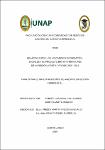| dc.contributor.advisor | Pinedo Manzur, Freddy Martín | |
| dc.contributor.advisor | Pasquel Flores, Beny | |
| dc.contributor.author | Weill Valladares, Robert Luis | |
| dc.contributor.author | Zumaeta Hidalgo, Jairo | |
| dc.date.accessioned | 2019-10-17T16:31:15Z | |
| dc.date.available | 2019-10-17T16:31:15Z | |
| dc.date.issued | 2019 | |
| dc.identifier.other | 339.31 W38 2019 | |
| dc.identifier.uri | http://repositorio.unapiquitos.edu.pe/handle/20.500.12737/6455 | |
| dc.description.abstract | El crecimiento o deterioro de un país o una región se mide a través del Producto Bruto Interno (PBI), variable cuantitativa que mide la cantidad de bienes y servicios creado por la economía en un periodo determinado. En la presente investigación, esta variable es correlacionada con los indicadores económicos – sociales de la región Loreto, tratando de hallar evidencias de la transmisión del resultado del Producto Bruto Interno (PBI) a la parte cualitativa de la población, traducida en una mejora del nivel de vida. El objetivo de la presente investigación es determinar la relación entre los indicadores económicos-sociales y el Producto Bruto Interno (PBI) de la región Loreto, periodo 2009 – 2014. Para ello, se llevó a cabo la presente investigación de tipo Correlacional y de diseño No Experimental, analizando la evolución del Producto Bruto Interno (PBI), la Pobreza, la Pobreza Extrema, Población Económicamente Activa Ocupada (PEA Ocupada), y el Analfabetismo. Al correlacionar la Pobreza con el Producto Bruto Interno (PBI), la prueba estadística arroja como resultado que el Coeficiente de Correlación ( r ) = -0.99079599; valor muy cercano a -1, lo que indica una muy buena correlación inversa entre las variables, situación que se corrobora con el resultado del Coeficiente de Determinación ( R2 ) que es R2 = 0.98167669; muy cercano a 1 indicando que la Variable Independiente (PBI) determina el comportamiento de la Variable Dependiente (Pobreza). Del mismo modo, la correlación de la Población Económicamente Activa Ocupada (PEA Ocupada) con el Producto Bruto Interno (PBI) dio como resultado que el Coeficiente de Correlación ( r ) = 0.84799010 significando una buena correlación entre variables, y el Coeficiente de Determinación (R2) = 0.71908722 lo que explica que existe buena determinación entre variables; es decir, el Producto Bruto Interno (PBI) determina el comportamiento de la Población Económicamente Activa Ocupada (PEA Ocupada). No sucede lo mismo cuando se correlaciona el Analfabetismo con el Producto Bruto Interno (PBI), pues los resultados del test estadístico señalan que no existe correlación ni determinación entre las variables al haberse obtenido los siguientes valores: Coeficiente de Correlación ( r ) = -0.52013461; muy alejado de -1; y Coeficiente de Determinación (R2) = 0.27054001; muy alejado de 1.
Palabras Clave: Producto Bruto Interno (PBI), Pobreza, Pobreza Extrema. Población Económicamente Activa (Ocupada), Analfabetismo. | es_PE |
| dc.description.abstract | The growth or deterioration of a country or a region is measured through the Gross Domestic Product (GDP), a quantitative variable that measures the quantity of goods and services created by the economy in a given period. In the present investigation, this variable is correlated with the economic - social indicators of the Loreto region, trying to find evidence of the transmission of the result of the Gross Domestic Product (GDP) to the qualitative part of the population, translated into an improvement in the level of life. The objective of the present investigation is to determine the relationship between economic-social indicators and the Gross Domestic Product (GDP) of the Loreto region, period 2009 - 2014. For this, the present Correlational and design research was carried out Non-Experimental, analyzing the evolution of the Gross Domestic Product (GDP), Poverty, Extreme Poverty, Occupied Economically Active Population (PEA), and Illiteracy. When correlating Poverty with the Gross Domestic Product (GDP), the statistical test shows that the Correlation Coefficient (r) = -0.99079599; value very close to -1, which indicates a very good inverse correlation between the variables, a situation that is corroborated with the result of the Determination Coefficient (R2) which is R2 = 0.98167669; very close to 1 indicating that the Independent Variable (GDP) determines the behavior of the Dependent Variable (Poverty). Similarly, the correlation of the Occupied Economically Active Population (PEA) with the Gross Domestic Product (GDP) gave as a result that the Correlation Coefficient (r) = 0.84799010 meaning a good correlation between variables, and the Determination Coefficient (R2) = 0.71908722 which explains that there is good determination between variables; that is to say, the Gross Domestic Product (GDP) determines the behavior of the Economically Active Population (Employed PEA). The same does not happen when Illiteracy is correlated with the Gross Domestic Product (GDP), since the results of the statistical test indicate that there is no correlation or determination among the variables, since the following values have been obtained: Correlation Coefficient (r) = -0.52013461; very far from -1; and Coefficient of Determination (R2) = 0.27054001; very far from 1. | en_US |
| dc.description.uri | Tesis | es_PE |
| dc.format | application/pdf | es_PE |
| dc.language.iso | spa | es_PE |
| dc.publisher | Universidad Nacional de la Amazonía Peruana | es_PE |
| dc.rights | info:eu-repo/semantics/openAccess | es_PE |
| dc.rights | Attribution-NonCommercial-NoDerivs 3.0 United States | * |
| dc.rights.uri | http://creativecommons.org/licenses/by-nc-nd/3.0/us/ | * |
| dc.source | Universidad Nacional de la Amazonía Peruana | es_PE |
| dc.source | Repositorio institucional - UNAP | es_PE |
| dc.subject | Producto interior bruto | es_PE |
| dc.subject | Indicadores socioeconómicos | es_PE |
| dc.subject | Pobreza | es_PE |
| dc.title | Relación entre los indicadores económicos - sociales y el producto bruto interno (PBI) de la región Loreto, periodo 2009-2014 | es_PE |
| dc.type | info:eu-repo/semantics/masterThesis | es_PE |
| thesis.degree.discipline | Ciencias Económicas y de Negocios | es_PE |
| thesis.degree.grantor | Universidad Nacional de la Amazonía Peruana. Escuela de Posgrado | es_PE |
| thesis.degree.level | Maestría | es_PE |
| thesis.degree.name | Maestro(a) en Gestión Empresarial | es_PE |
| thesis.degree.program | Presencial | es_PE |
| dc.subject.ocde | http://purl.org/pe-repo/ocde/ford#5.02.04 | es_PE |


